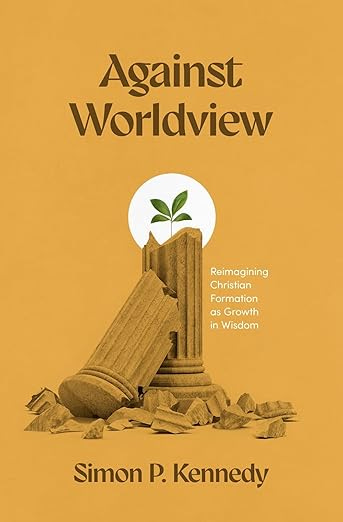Is Christian Bias the Solution to Secular Bias?
My Review of Against Worldview, by Simon P. Kennedy, in American Reformer
“Christian teaching about worldview has done much to alert us to the biases that prevent secular scholars and journalists from objectivity. But is worldview the right solution, or a concession to subjectivism?”
So I write, in my recent review of the new book Against Worldview, by Simon P. Kennedy, published at American Reformer.
Readers of this Substack may recognize my growing suspicion of talk of worldview, my suspicion that it is tied to the philosophies of coherentism and idealism. I got to explore this through reading and reviewing Kennedy’s book.
I’ll be speaking to Simon Kennedy next week on the podcast. We’ll tackle what worldview-discourse gets right and what it gets wrong. Maybe we’ll even ask whether worldview-discourse is a “transitional discourse.”
Here’s an excerpt from my review:
Kennedy intriguingly claims that the modern worldview movement arose from a context of culture war, the “positive world” in Aaron Renn’s “three worlds of evangelicalism” model. Kennedy says, “Christian worldview education emerged in the latter part of the twentieth century as a defensive weapon in an age of cultural combat. Our situation is different now and requires a different approach to worldview in education.” My question is whether worldview-thinking is bad only because times have changed, or because it is wrong on the merits.
In fact, Kennedy’s own arguments have shown that worldview-thinking is not only out-of-place, but also wrong on the merits. In Kuyper’s time, Van Til’s, Schaeffer’s, and our own, worldview thinking has encouraged an all-or-nothing intellectual approach. It has discouraged patient, objective engagement in the fields of secular and humanistic learning. Even Christian academics, like Alvin Plantinga and Nicholas Wolterstorff (who blurbed the book) who were shaped by Dutch Neo-Calvinism, had to overcome simplistic Christian worldview thinking in order to engage in serious scholarship.
Click over to read the whole thing: American Reformer: “Is Christian Bias the Solution to Secular Bias?” by Joel Carini






Wouldn’t the danger of this approach be that it makes permissible conclusions that are contrary to scripture? For example an inductive approach to understanding sexuality would catalog same-sex sexual interactions and ambiguous sexual categories in the animal kingdom to make normative claims about human sexuality that would contradict Biblical teaching. On the other hand, a Christian worldview approach allows those observations to be bracketed due to the Bible’s teachings of man’s unique moral stature.
In other words, how is an “inductive” approach different from a “secular” approach?
It seems to me that we have two worldviews “warring in our members” as Paul said (Romans 7:23) There is the troubling unintentional worldview we all have constructed from our experiences to date which, as you say, is a concession to subjectivism. The other is a worldview built intentionally from the reading of scripture, fellowship with faithful saints, and Face-to-face encounters with God. The first is fraught with untruth by virtue of its source in the perceptions of our humanity, but the second is as truthful as the measure of our commitment to Christ’s discipleship.
There is a third sense of the term worldview found in the “isms” of our culture. We can see them displayed on the spines of books in the library. Capitalism and Communism, Calvinism and Arminianism, Evangelicalism and Catholicism, (etc ad nauseum) are all the spouting of formal worldviews of which no one believes in their entirety. They are usually (universally?) descriptions of the author’s idealism.